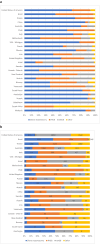Metabolic Bariatric Surgery Across the IFSO Chapters: Key Insights on the Baseline Patient Demographics, Procedure Types, and Mortality from the Eighth IFSO Global Registry Report
- PMID: 38592648
- PMCID: PMC11031475
- DOI: 10.1007/s11695-024-07196-3
Metabolic Bariatric Surgery Across the IFSO Chapters: Key Insights on the Baseline Patient Demographics, Procedure Types, and Mortality from the Eighth IFSO Global Registry Report
Abstract
Introduction: The International Federation for Surgery for Obesity and Metabolic Disorders (IFSO) Global Registry aims to provide descriptive data about the caseload and penetrance of surgery for metabolic disease and obesity in member countries. The data presented in this report represent the key findings of the eighth report of the IFSO Global Registry.
Methods: All existing Metabolic and Bariatric Surgery (MBS) registries known to IFSO were invited to contribute to the eighth report. Aggregated data was provided by each MBS registry to the team at the Australia and New Zealand Bariatric Surgery Registry (ANZBSR) and was securely stored on a Redcap™ database housed at Monash University, Melbourne, Australia. Data was checked for completeness and analyzed by the IFSO Global Registry Committee. Prior to the finalization of the report, all graphs were circulated to contributors and to the global registry committee of IFSO to ensure data accuracy.
Results: Data was received from 24 national and 2 regional registries, providing information on 502,150 procedures. The most performed primary MBS procedure was sleeve gastrectomy, whereas the most performed revisional MBS procedure was Roux-en-Y gastric bypass. Asian countries reported people with lower BMI undergoing MBS along with higher rates of diabetes. Mortality was a rare event.
Conclusion: Registries enable meaningful comparisons between countries on the demographics, characteristics, operation types and approaches, and trends in MBS procedures. Reported outcomes can be seen as flags of potential issues or relationships that could be studied in more detail in specific research studies.
Keywords: Demographics; International trends; Metabolic bariatric surgery; Registry.
© 2024. The Author(s).
Conflict of interest statement
Wendy A. Brown reports Grants from Johnson and Johnson, Medtronic, GORE, Applied Medical, Novo Nordisk, NHMRC, and the Australian Commonwealth Government. Personal fees from Johnson and Johnson, GORE, Novo Nordisk, Pfizer, Medtronic, Lily, and Merck Sharpe and Dohme for lectures and advisory boards. Ricardo Cohen reports Research grant paid to their Institution from Johnson and Johnson and Medtronic; Advisory board for Morphic Medical, Baritek, and Medtronic; Speaker for Johnson and Johnson, Medtronic, and NovoNordisk. Francois Pattou reports a speaker honorarium from Medtronic, Ethicon, Lexington, Novo-Nordisk, and Lilly. Benjamin Clapp reports being a consultant for Medtronic; a travel stipend from Moon Surgical; food from Ethicon. Gerhard Prager reports speaker fees and educational grants from Metronic; educational grants from Novo Nordisk and Johnson and Johnson. Scott Shikora reports being the Editor in Chief of Obesity Surgery. All other authors declare no competing interests.
Figures





References
-
- Gliklich RE, Dreyer NA, Leavy MB, editors. Registries for evaluating patient outcomes: a user's guide. 3rd ed. Rockville (MD): Agency for Healthcare Research and Quality (US); 2014. - PubMed
MeSH terms
Grants and funding
LinkOut - more resources
Full Text Sources
Medical
Research Materials

